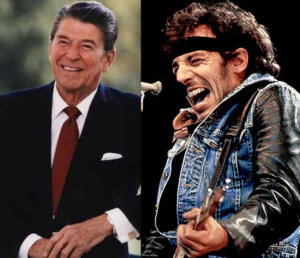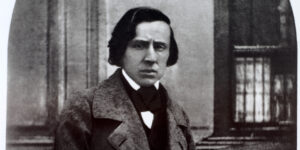Share This:
October 19, 2015 | Theatre,
Do Not Use Our Music
It’s an event you can almost set your watch to these days: a U.S. politician plays a popular U.S. artist’s music at a rally, and in turn, that artist tells them not to associate their music with the politician’s particular brand of politics. Just this week we saw Donald Trump’s campaign make use of Aerosmith’s “Dream On” for a hot second before Steven Tyler had his lawyer send a cease-and-desist letter. The precise legal concern was that it might create a “false sense of endorsement.” R.E.M.’s Michael Stipe wasn’t as polite, broadcasting this message to Twitter after Trump utilized the Georgia band’s classic song “It’s the End of the World as We Know It (And I Feel Fine),”: “Do not use our music or my voice for your moronic charade of a campaign.” Literally, the list goes on and on.
Tracing the origins of this music-vs-politician tug-of-war, you might end up back in 1984 with Ronald Reagan’s usage of Bruce Springsteen’s “Born in the USA,” but dig a little deeper, and you can see how this struggle is not new in any sense. Just ask Frédéric François Chopin.
One problem: he died in 1849, so you can’t, but his music is still fought over in Poland as representative of various political movements and certain brands of nationalism. With the artist no longer present to correct the misleading co-opting of his work, it begs the question, who stands up for an artist’s works and wishes after their death? With Chopin without Piano, we get an unlikely answer to an odd question.
By reading the barebones description of the play —“Take two Chopin concerti, remove the piano and replace it with an intimate, raw conversation on the composer’s life and radical approach to music” — its easy to assume that the intent of this play is purely musical, or some kind of abstract artistic notion, but the work truly comes alive when you immerse yourself in the true intent of the work. Here’s Professor Allen James Kuharski from Swathmore College on Chopin without Piano’s proper context:
The banishing of the piano from the performance of Chopin’s Concertos is a radical act of cultural blasphemy. Rather than mere provocation, the goal is to renew and transform a tradition that began with precisely such creative rebellion and innovation. The question is how to reanimate the creative principle embodied by Chopin rather than historically reconstruct him.
As with the Czarist forces in nineteenth-century Warsaw, this is undeniably also a symbolic political act. It is a critique of Chopin’s pianism as a tool of mutual oppression by Poles, of its associations with nationalism and passéisme instead of as the means of mutual liberation, individual empowerment, and unfettered creativity it represented in Chopin’s day.
Understood as a new piece of contemporary theater, the goal of this experiment is the generation of an unprecedented Polish work.
In this way, we can see how the political interventions of Neil Young, R.E.M., and Bruce Springsteen are following in a tradition of artists being coopted for political purposes long before the first vinyl record was ever sold. Steven Tyler is still alive. He can ask Donald Trump to directly keep his hands off his music. But who will do the same for a deceased artist like Chopin? With this new, exciting form of theatre, we receive an answer.
- Ryan Walsh
Chopin without Piano runs NOV 11 – 14. Get tickets now!








Leave a Reply